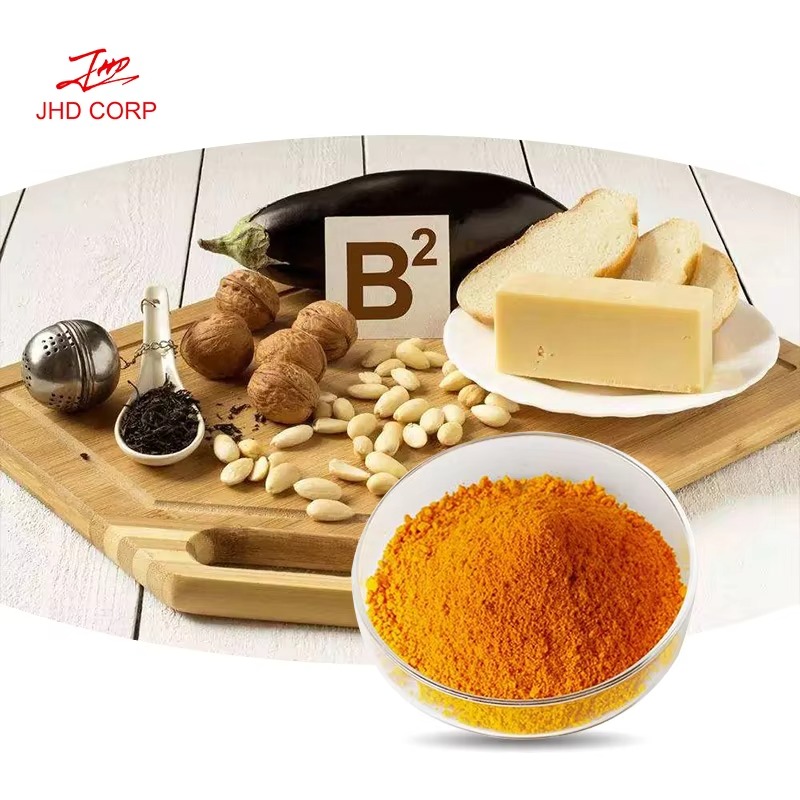Welcome to JHD Nutrasource!
Shop
Vitamin B2
Vitamin B₂, also known as riboflavin, is a water – soluble vitamin. It is a yellow – orange compound and is relatively stable in acidic environments, but it can be easily destroyed by light and heat in alkaline conditions. Riboflavin is widely found in nature, with good sources including milk, eggs, green leafy vegetables, and some cereals.
Description
| Product Name | Vitamin B2 |
| Appearance | Orange yellow powder |
| Purity | 98% |
| Certificate | Kosher/ Halal /BRC /ISO/ Organic |
| Grade | Food Garde |
| Effectiveness | Healthcare Products |
Function
- Energy Metabolism: Riboflavin is a crucial component of flavoproteins. These flavoproteins, such as flavin mononucleotide (FMN) and flavin adenine dinucleotide (FAD), play a key role in the electron transport chain in cellular respiration. For example, in the citric acid cycle, FAD acts as a cofactor for succinate dehydrogenase, helping to transfer electrons and facilitate the conversion of succinate to fumarate. This process is essential for the production of ATP (adenosine triphosphate), the energy currency of the cell.
- Antioxidant Function:It helps to protect cells from oxidative damage. Riboflavin is involved in the production of glutathione, a major antioxidant in the body. Glutathione can neutralize free radicals, which are harmful molecules that can damage cell membranes, DNA, and other cellular components. By maintaining the levels of glutathione through its role in metabolism, riboflavin contributes to the overall antioxidant defense system of the body.
- Maintenance of Mucous Membranes: It is important for the health of mucous membranes in the body, such as those in the mouth, throat, and digestive tract. Riboflavin helps to maintain the integrity of these membranes by supporting the normal growth and repair of cells. A deficiency in riboflavin can lead to symptoms like angular cheilitis (cracks at the corners of the mouth) and glossitis (inflammation of the tongue).
Application
- Food Industry: It is used as a food additive. In fortified foods, such as breakfast cereals and some types of bread, riboflavin is added to increase the nutritional value. This is particularly important for populations that may have inadequate dietary intake of this vitamin. It can also be used as a colorant in some food products due to its yellow – orange color, although its primary use is for its nutritional benefits.
- Pharmaceuticals: Riboflavin supplements are available for people who have a deficiency. This can occur in certain medical conditions, such as malabsorption syndromes, or in individuals with poor dietary habits. In addition, riboflavin has been studied for its potential therapeutic uses. For example, high – dose riboflavin has been investigated as a treatment option for some types of migraine headaches. It is thought to work by improving mitochondrial function in the brain, which may help to reduce the frequency and severity of migraines.
- Animal Nutrition: In animal feed, riboflavin is added to ensure the proper growth and development of livestock. For instance, in poultry farming, adequate riboflavin in the diet is essential for the healthy development of feathers and for maintaining the overall health of the birds. In ruminant animals like cows, it is important for milk production and for the normal functioning of the digestive system.

